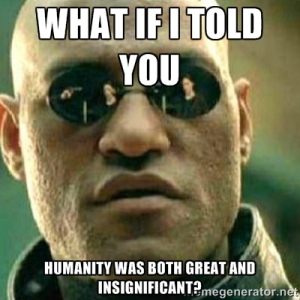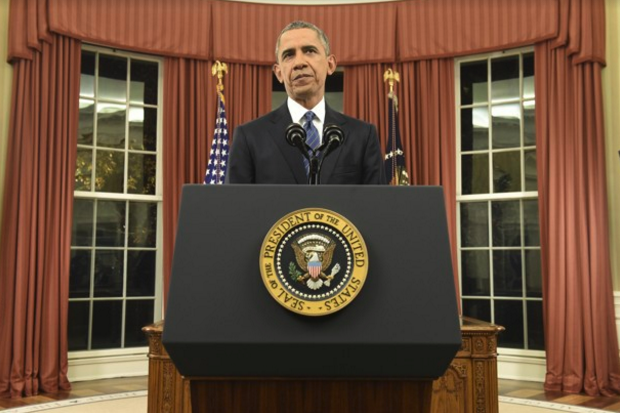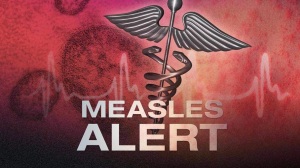Have you ever noticed that people are really good at celebrating the greatness of humanity?
We love to watch, talk about, and read about great human achievements, whether they come on the sports field, the silver screen, the concert stage or the pages of a book. Right now, your Facebook feed is littered with people declaring, “Look how great this is!” Our culture particularly loves to lift up the collective achievements of mankind – think, for example, of the national pride that swelled up when we first put a man on the moon.
You might hear a different message from your Christian friends. Sure, they might celebrate the Giants’ World Series win with you, or talk breathlessly about the latest movie from their favorite director. But they also may talk about how insignificant – or downright bad – humanity is. Especially if you frequent church circles, you might get the impression that mankind is nothing terribly special, that we’re all really just wretched, lowly worms.

With apologies to Morpheus, what if I told you that our culture has it right, and that Christians can tend to wrongly downplay the significance and greatness of humanity? And what if I told you that Christians have it right as well, that the culture at large tends to over-esteem our significance? There is a great tension at play here between the insignificance and greatness of humanity.
Our Insignificance
What does it mean to say that humanity is insignificant? The Bible is chock full of reminders for us of how insignificant we are, at least as compared to God.
When King David gazed upon the night sky and considered the awesomeness of God’s works in the heavens, he penned these song lyrics: “When I look at your heavens, the work of your fingers, the moon and the stars, which you have set in place, what is man, that you are mindful of him, and the son of man that you care for him?” (Psalm 8:3-4). David’s mind was blown by the greatness of the cosmos, and even more so by the magnificent God who created them, as it were, with his fingers. He sees the heavens and thinks, “How is it that the great God behind all of this gives a passing thought to something as lowly as man, much less cares for him?”
In a different song, David again highlights the insignificance of mankind in comparison to God: “As a father shows compassion to his children, so the Lord shows compassion to those who fear him. For he knows our frame; he remembers that we are dust. As for man, his days are like grass; he flourishes like a flower of the field; for the wind passes over it, and it is gone, and its place knows it no more. (Psalm 103:14-16). God shows compassion to mankind because we are mere dust. Our days are like the fleeting life of grass in the field, which sprouts up one day and is gone the next.
These same themes – mankind as grass or dust – are echoed elsewhere in the Bible as well. Isaiah uses grass to compare the passing nature of our flesh to the immortal nature of God’s word: “All flesh is grass, and all its beauty is like the flower of the field. The grass withers, the flower fades when the breath of the Lord blows on it; surely the people are grass. The grass withers, the flower fades, but the word of our God will stand forever.” (Isaiah 40:6-8). Mankind’s collective worth fares no better in comparison to God’s worth: “Behold, the nations are like a drop from a bucket, and are accounted as the dust on the scales; behold, he takes up the coastlands like fine dust. Lebanon would not suffice for fuel, nor are its beasts enough for a burnt offering. All the nations are as nothing before him, they are accounted by him as less than nothing and emptiness.” (Isaiah 40:15-17). Gather up all the billions of people in the world today, and they stand before God as nothing.
David’s son Solomon picks up on the theme of mankind as mere dust, noting that humanity shares the same fate as the beasts of the field: “For what happens to the children of man and what happens to the beasts is the same; as one dies, so dies the other. They all have the same breath, and man has no advantage over the beasts, for all is vanity. All go to one place. All are from the dust, and to dust all return.” (Ecclesiastes 3:19-20). Cows come from the dust, have a brief breath of life, and return to the dust. So do people.
These kinds of reminders are not limited to the Old Testament. In his letter to the church in Philippi, Paul exhorts them to have the humility to count others more significant than themselves, pointing to the ultimate example of humility in Jesus, “who, though he was in the form of God, did not count equality with God a thing to be grasped, but emptied himself, by taking the form of a servant, being born in the likeness of men.” (Philippians 2:6-7). The fact that Jesus took on human nature was so striking because of the humility it took to bridge the vast gulf between the dignity of God and the lowly state of humanity.
Our Greatness
If humanity is so insignificant, where does that leave us? Doesn’t that idea run contrary to other ideas commonly embraced by Christians about the sanctity of life, etc.? While God wants us to know the place of humility we occupy before him, he also wants us to know how great we are.
The greatness of humanity is not a separate category from God’s greatness. Our greatness is tied to the fact that God made us in his image. Putting aside issues of exactly when and how God created mankind, the account in Genesis clearly communicates that God made man and woman to reflect his image in a way that was not true of the rest of his creation:
Then God said, “Let us make man in our image, after our likeness. And let them have dominion over the fish of the sea and over the birds of the heavens and over the livestock and over all the earth and over every creeping thing that creeps on the earth.” So God created man in his own image, in the image of God he created him; male and female he created them. (Genesis 1:26-27).
When I was a kid, I had the notion that our being created in the image of God meant that we somehow look like God in our physical form. That makes little sense, of course, in light of other places that describe God as spirit and without physical form. For example, Jesus says that “God is spirit” (John 4:24), and elsewhere that “a spirit does not have flesh and bones.” (Luke 24:39).
The fact that we are created “in the image of God” means simply that humans are like God and that we represent him. We can see that most clearly in the one perfect man who ever lived, Jesus. He is described as “the image of God” (2 Corinthians 4:4), “the image of the invisible God, the firstborn of all creation” (Colossians 1:15), and “the radiance of the glory of God and the exact imprint of his nature.” (Hebrews 1:3). In other words, Jesus showed what man as the image of God was all about because he was just like God and represented him perfectly.
We, on the other hand, are not completely like God, and quite often do not represent him very well. Unlike Jesus, we have a broken, sinful nature. Nevertheless, there remains in all humanity something of the image of God. That is why we can speak intelligibly about the dignity of human life, for example, and make distinctions between human beings and other sentient life that don’t just boil down to “might makes right.”
The Bible does not give us an explicit list of the ways in which we are like God, but we can pretty easily discern ways in which people are more like God than the rest of creation, including:
- Our sense of morality, justice and accountability
- The fact that we have a spiritual life that transcends the physical realm
- Our ability to think logically about the world around us
- Our use of the spoken and written word to communicate
- Our innate creativity and love of beauty, and
- The depth and character of our relationships and love for each other
Because people uniquely bear God’s image, we occupy a very special place in his creation. Right after David marvels over the fact that God is mindful of something as lowly as mankind, he turns with wonder to our high position: “Yet you have made him a little lower than the heavenly beings and crowned him with glory and honor. You have given him dominion over the works of your hands; you have put all things under his feet.” (Psalm 8:5-6).
That high position has tremendous implications. James says our tongue is a “restless evil, full of deadly poison,” because “[w]ith it we bless our Lord and Father, and with it we curse people who are made in the likeness of God.” (James 3:9). The great offense of speaking evil of people is that they bear the inherent dignity of the likeness of God!
In a larger sense, that is also the tragedy of the fallen state of mankind. The glorious image bearer of the great and glorious God of all has traded the truth for a lie and traded that glory for lesser things. (Romans 1:18-25). People who were created to be like God and represent him well have instead rebelled against God, turned their backs on him, and now misrepresent him in word and deed. That’s a tragedy and offense beyond our ability to comprehend.
Reconciliation
Ah, but there is good news. Humanity’s insignificance and greatness come together in Jesus. After pointing to Jesus as the ultimate example of humility in that God took on human nature, Paul goes on to explain how Jesus’s humility led to his exaltation:
And being found in human form, he humbled himself by becoming obedient to the point of death, even death on a cross. Therefore God has highly exalted him and bestowed on him the name that is above every name, so that at the name of Jesus every knee should bow, in heaven and on earth and under the earth, and every tongue confess that Jesus Christ is Lord, to the glory of God the Father. (Philippians 2:8-11).
Through Jesus’s death and resurrection, the door was opened for the restoration of humanity to our intended position as God’s image bearers through the forgiveness of our sins:
[I]f anyone is in Christ, he is a new creation. The old has passed away; behold, the new has come. All this is from God, who through Christ reconciled us to himself . . .; that is, in Christ God was reconciling the world to himself, not counting their trespasses against them . . . . We implore you on behalf of Christ, be reconciled to God. For our sake he made him to be sin who knew no sin, so that in him we might become the righteousness of God. (2 Corinthians 5:17-21).
So now, we who have trusted in Christ are being progressively changed back into the image of God. As Paul put it, we are “being transformed into the same image from one degree of glory to another.” (2 Corinthians 3:18). Indeed, that was God’s purpose in calling us broken sinners to himself in the first place, to “be conformed to the image of his Son.” (Romans 8:29). And we have the hope that some day, we will be made like him in the fullest sense, reflecting and imaging his glory perfectly instead of misrepresenting him and denigrating his glory.
Embracing the Tension
In the end, we are left with two truths in tension. First, there is greatness in humanity. Namely, all the ways in which we bear the image of God, even in our fallen state. Christians would do well to acknowledge and celebrate the greatness of mankind, even though the image of God in man has been marred in so many ways. Second, in comparison to God, humanity is very, very insignificant. The greatness of humanity is not worthy of comparing to the greatness of God. Christians need to hold these truths in tension so that we can be true ambassadors for Jesus, imploring people as Paul did to be reconciled to God so that we can stand in humility before him, while also taking our rightful place as the bearers of his great image.










